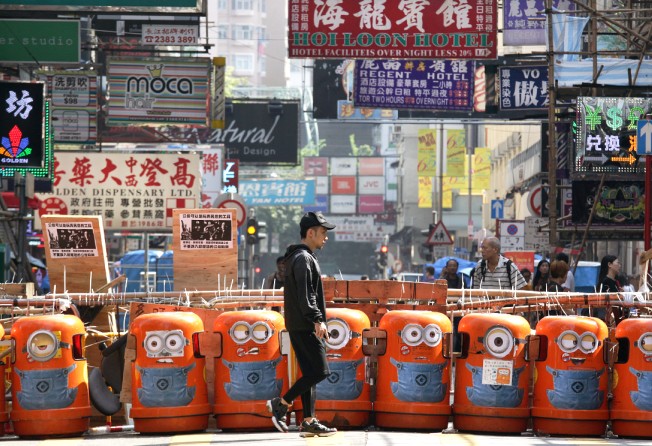Police can arrest protesters who obstruct bailiffs, Hong Kong's High Court rules
Mong Kok and Admiralty occupied zones could be cleared within days, after High Court ruling

Police can now arrest Occupy Central protesters who defy bailiffs trying to clear their sit-in sites in Mong Kok and Admiralty, the High Court has ruled.
The court's authorisation for the bailiffs to get help from the police if necessary is a new addition to three interim restraining orders - on behalf of drivers' groups and the owner of a commercial building - in force for the past three weeks.
With the court's permission, the force could start removing barricades and defiant protesters from their occupied zone in Mong Kok as early as tomorrow, according to a police source.
The Department of Justice said yesterday that while the police would provide assistance in respect of the enforcement of the injunction orders, the Secretary for Justice might also "consider taking appropriate action against persons who may have committed the offence of criminal contempt".
In his judgment yesterday, Mr Justice Thomas Au Hing-cheung extended the orders and said officers could remove or arrest people who ignored or insisted on breaching them.
They must, however, offer a brief explanation of the order at the point of arrest, Au wrote.
The judge explained that he allowed the police to step in because the rule of law and due administration of justice were at risk of being "seriously challenged and undermined", as some protesters had been openly disobeying and flouting the court orders.
"Under the rule of law, even if the defendants are of the view that a court order is wrongly granted, instead of simply disobeying it, they should first comply with it but seek to challenge and argue against that order in court," Au wrote.
Au's judgment means the applicants for injunctions against the Occupy movement do not need to return to the courts for further extensions of their orders.
The injunctions were first granted on October 20, to Chiu Luen Public Light Bus, the Taxi Association and the Taxi Drivers and Operators Association, for parts of Nathan Road to be cleared. The court also allowed Goldon Investment, owner of Citic Tower in Admiralty, to remove barricades blocking the building's entrances and exits.
The police source warned that protesters who still refused to move faced arrest for contempt of court. He said the Mong Kok protest zone was likely to be the first to be cleared, either Wednesday or Thursday.
The source said enough manpower would be arranged to deal with any eventuality.
Outside court, solicitor Maggie Chan Man-ki, for the minibus drivers, said: "My clients only want to have the road back to do business."
Transport-sector lawmaker Frankie Yick Chi-ming said no actions should be above the law and well-being of the society. "[Occupy] has plunged our sector into hardship," he said.
But fellow lawmaker Albert Chan Wai-yip said the court had taken into account only the plaintiffs' arguments.
He saw two scenarios should police start clearing the sites: protesters would either get arrested in the thousands, or leave and congregate elsewhere.
Chan said they would consider filing an appeal after consulting lawyers.